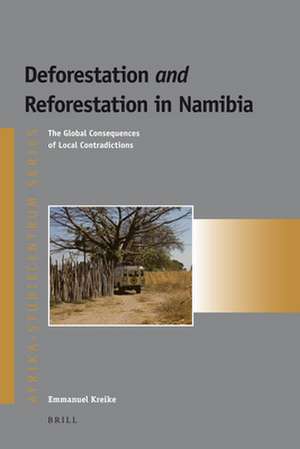Deforestation and Reforestation in Namibia: The Global Consequences of Local Contradictions: Afrika-Studiecentrum Series, cartea 17
Autor Emmanuel Kreikeen Limba Engleză Paperback – 25 oct 2009
Din seria Afrika-Studiecentrum Series
-
 Preț: 346.23 lei
Preț: 346.23 lei -
 Preț: 347.46 lei
Preț: 347.46 lei -
 Preț: 345.47 lei
Preț: 345.47 lei -
 Preț: 347.76 lei
Preț: 347.76 lei -
 Preț: 347.27 lei
Preț: 347.27 lei -
 Preț: 342.53 lei
Preț: 342.53 lei -
 Preț: 351.07 lei
Preț: 351.07 lei -
 Preț: 343.00 lei
Preț: 343.00 lei -
 Preț: 347.76 lei
Preț: 347.76 lei -
 Preț: 352.47 lei
Preț: 352.47 lei -
 Preț: 346.79 lei
Preț: 346.79 lei -
 Preț: 347.27 lei
Preț: 347.27 lei -
 Preț: 348.21 lei
Preț: 348.21 lei -
 Preț: 345.86 lei
Preț: 345.86 lei -
 Preț: 348.21 lei
Preț: 348.21 lei -
 Preț: 344.91 lei
Preț: 344.91 lei -
 Preț: 367.67 lei
Preț: 367.67 lei - 18%
 Preț: 348.21 lei
Preț: 348.21 lei -
 Preț: 347.27 lei
Preț: 347.27 lei -
 Preț: 347.27 lei
Preț: 347.27 lei -
 Preț: 347.35 lei
Preț: 347.35 lei -
 Preț: 346.79 lei
Preț: 346.79 lei -
 Preț: 346.79 lei
Preț: 346.79 lei -
 Preț: 345.37 lei
Preț: 345.37 lei -
 Preț: 345.37 lei
Preț: 345.37 lei -
 Preț: 356.29 lei
Preț: 356.29 lei -
 Preț: 343.10 lei
Preț: 343.10 lei -
 Preț: 349.17 lei
Preț: 349.17 lei -
 Preț: 361.19 lei
Preț: 361.19 lei - 27%
 Preț: 346.79 lei
Preț: 346.79 lei -
 Preț: 348.94 lei
Preț: 348.94 lei -
 Preț: 342.92 lei
Preț: 342.92 lei -
 Preț: 345.94 lei
Preț: 345.94 lei -
 Preț: 350.87 lei
Preț: 350.87 lei -
 Preț: 345.94 lei
Preț: 345.94 lei -
 Preț: 344.80 lei
Preț: 344.80 lei -
 Preț: 352.11 lei
Preț: 352.11 lei
Preț: 345.37 lei
Nou
Puncte Express: 518
Preț estimativ în valută:
66.08€ • 69.18$ • 54.68£
66.08€ • 69.18$ • 54.68£
Carte indisponibilă temporar
Doresc să fiu notificat când acest titlu va fi disponibil:
Se trimite...
Preluare comenzi: 021 569.72.76
Specificații
ISBN-13: 9789004179912
ISBN-10: 9004179917
Pagini: 226
Dimensiuni: 160 x 240 x 15 mm
Greutate: 0.41 kg
Ediția:New.
Editura: Brill
Colecția Brill
Seria Afrika-Studiecentrum Series
ISBN-10: 9004179917
Pagini: 226
Dimensiuni: 160 x 240 x 15 mm
Greutate: 0.41 kg
Ediția:New.
Editura: Brill
Colecția Brill
Seria Afrika-Studiecentrum Series
Cuprins
Contents
Acknowledgments ix
Abbreviations xiii
Maps xv
Photos xvii
1. Approaches to environmental change
Models of environmental change
The modernization paradigm
The declinist paradigm
The inclinist paradigm
Paradoxes of environmental change
2. Tree castles and population bombs
Tree castles and insecurity on the eve of colonial conquest
Portuguese violence and population fight into Ovamboland
Internal migration in South Africa’s Ovamboland
Tree castles and deforestation in the 1920s to 1940s
Colonial concerns about overpopulation and deforestation in the 1950s
Population growth in Ovamboland
Woody vegetation resources by the close of the twentieth century
3. Conquest of Nature: Imperial political ecologies
The political ecology of insecurity
Indirect environmental rule
The colonial conquest of Nature: Direct environmental rule
4. Fierce species: Biological imperialism
Invading microbes and virgin soil epizootics
Invading microbes and virgin soil epidemics
A plague of donkeys: Fierce invading equines
Fierce indigenous creatures on the rampage
5. Guns, hoes and steel:
Techno-environmental determinism
Guns
Steel tools
Steel plows
Guns and steel in north-central Namibia
6.Naturalizing cattle culture: Colonialism as a deglobalizing and decommodifying force
The cattle complex and environmental degradation
Ovambo cattle as global commodities
Cattle, culture and nature
Overstocking and biological time bombs
Colonial barriers: Conservation and fences
Grazing pressure and desertification
Livestock and deforestation
Commodification, deglobalization and deforestation
7. The Palenque paradox: Beyond Nature-to-Culture
Bush cities and the bush
‘Bushmen’ and the bush
8. The Ovambo paradox and environmental pluralism
Deforestation in Ovamboland
Reforestation in Ovamboland
Environmental pluralism: Multiprocessual asynchronous environmental change
Bibliography
Index
Acknowledgments ix
Abbreviations xiii
Maps xv
Photos xvii
1. Approaches to environmental change
Models of environmental change
The modernization paradigm
The declinist paradigm
The inclinist paradigm
Paradoxes of environmental change
2. Tree castles and population bombs
Tree castles and insecurity on the eve of colonial conquest
Portuguese violence and population fight into Ovamboland
Internal migration in South Africa’s Ovamboland
Tree castles and deforestation in the 1920s to 1940s
Colonial concerns about overpopulation and deforestation in the 1950s
Population growth in Ovamboland
Woody vegetation resources by the close of the twentieth century
3. Conquest of Nature: Imperial political ecologies
The political ecology of insecurity
Indirect environmental rule
The colonial conquest of Nature: Direct environmental rule
4. Fierce species: Biological imperialism
Invading microbes and virgin soil epizootics
Invading microbes and virgin soil epidemics
A plague of donkeys: Fierce invading equines
Fierce indigenous creatures on the rampage
5. Guns, hoes and steel:
Techno-environmental determinism
Guns
Steel tools
Steel plows
Guns and steel in north-central Namibia
6.Naturalizing cattle culture: Colonialism as a deglobalizing and decommodifying force
The cattle complex and environmental degradation
Ovambo cattle as global commodities
Cattle, culture and nature
Overstocking and biological time bombs
Colonial barriers: Conservation and fences
Grazing pressure and desertification
Livestock and deforestation
Commodification, deglobalization and deforestation
7. The Palenque paradox: Beyond Nature-to-Culture
Bush cities and the bush
‘Bushmen’ and the bush
8. The Ovambo paradox and environmental pluralism
Deforestation in Ovamboland
Reforestation in Ovamboland
Environmental pluralism: Multiprocessual asynchronous environmental change
Bibliography
Index
Notă biografică
Emmanuel Kreike, PhD (2006) in Forestry, Wageningen University, the Netherlands, and PhD (1996) in History, Yale University, is Associate Professor of History at Princeton University. He authored Re-Creating Eden: Land Use, Environment, and Society in Southern Angola and Northern Namibia (Heinemann, 2004).
